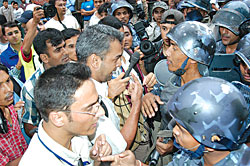No one knows how this will end. The king and the parties may settle their differences, Nepal may become a democratic republic or the Maoists may eventually prevail with a totalitarian regime. Some outcomes have greater probabilities than others but it is difficult to visualize the nature of the prospective political landscape of Nepal in the short term.
Regardless of who 'wins', principled historians are unlikely to look upon many in our media elite, liberals and those from whom they take their cue internationally with much sympathy. Many advocates of an unfettered free press and total democracy have participated in a concerted effort of misinformation, obfuscation and exaggeration. That some of these individuals were exposed to western ideals of intellectual inquiry may be baffling to some-but less so to others who are increasingly becoming aware of this group's ethos that shrouds rational debate with groupthink.
As professed (self-appointed in many cases) champions of human rights, democracy and liberalism, Nepali intellectuals have taken the responsibility for the 'people' they represent. In general, the media and political leaders have spoken the truth to those in power, as they should. Yet when it comes to the Maoists they gently whisper truth. During the municipal elections one party activist was killed and another seriously injured by the RNA during a demonstration in Dang. The incident has now been labelled 'a crime against humanity' and pictures of grieving relatives at the cremation are played out in the media ostensibly to promote the image of brutal authoritarianism in Nepal. But the story of the taxi driver shot in Patan by the Maoists to enforce their five-day national shutdown wasn't worthy to rate as an egregious violation of human rights.  The exaggeration has reached such proportions that incidents attributed to the royal government range from the garden variety 'crimes against humanity' to even 'genocide' as in the Nagarkot case. But when the Home Minister rationally outlined the brutal nature of the attack in Tansen and asked why the media and the parties failed to condemn it, he was rebutted by the seven party alliance with "we don't have to comment on every atrocity".
The exaggeration has reached such proportions that incidents attributed to the royal government range from the garden variety 'crimes against humanity' to even 'genocide' as in the Nagarkot case. But when the Home Minister rationally outlined the brutal nature of the attack in Tansen and asked why the media and the parties failed to condemn it, he was rebutted by the seven party alliance with "we don't have to comment on every atrocity".
The UN's ridiculous query for 'clarification' of what the Maoists meant by 'disrupting elections' was answered quite unambiguously by later actions.
Why should anyone care? First, there is a distortion of the very principle of rights itself. Exercising one's right for unfettered protest rates higher than someone's right to earn a workingman's living. Second, the exaggerated spin around hundreds of years of monarchic rule as the 'root cause' ends up giving us false assurance that culture, geography and a host of other factors has nothing to do with our political and economic predicament.
It detracts from the fact that the Maoists have devastated Nepal further in 10 years than in all of the years of dynastic rule, even before the Shahs. Nepal was created by this dynasty not from the consolidation of thriving democratic republics but ones with their own baggage of feudalism, oppression and economic backwardness. This doesn't mean that the Rana oligarchy and Shah autocracy were enlightened periods of rule but we must see them in perspective in light of the Maoists.
Note that next door, we have a kingdom that has ethnically cleansed 20 percent of its population, a situation that the UN, despite all its bluster, has been unable to solve. Nepal's royal government isn't by a long shot Burma, North Korea, Syria, Chechnya or even Bhutan. Context, nuance and perspective count, especially if one is preaching concepts of civil society and the rule of law as key values.
But instead of seeing the choices as bad and simply unacceptable, this campaign to characterise the regime as the most odious of all time has somehow convinced those that should be in the middle ground to back the unacceptable choice.
A more sober assessment will eventually emerge in the future and it is likely that it will in many cases be damning. At that time, they might realise that speaking truth to power means speaking truth to all power.



